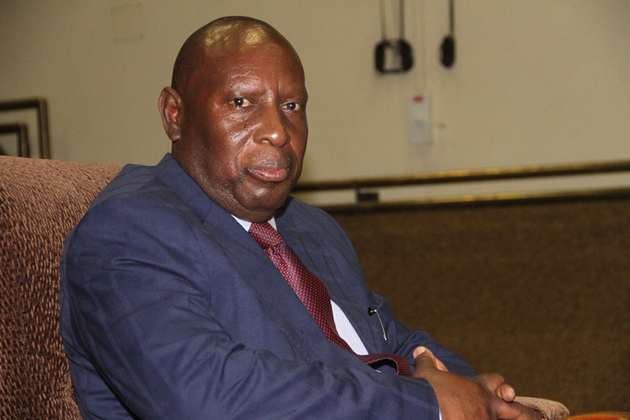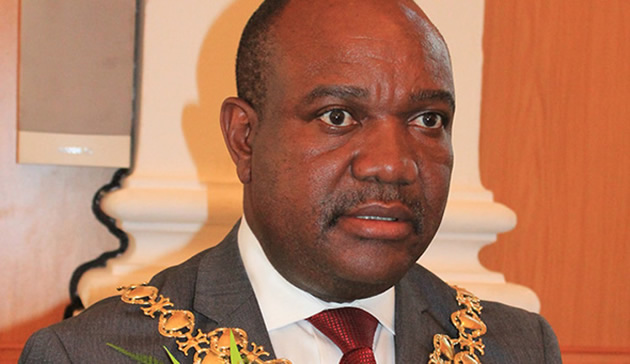National Pledge vs Sentamu’s vow on Zim


President Mugabe greets Anglican Bishop for the Church of the Province of Central Africa Harare Diocese Chad Gandiya while visiting Archbishop of Canterbury Justin Welby looks on at State House last month
Hildegarde The Arena
THE discourse on the National Pledge continues. It must be critiqued in its proper context, where so much will come out, which has nothing to do with the Pledge, but everything to do with opposing the Government of the day, using different tactics, since the same old elements opposed it while it was still fighting for the country’s independence in the 1960s and 1970s.
All those giving their point of view should also realise that while ideas cannot be evicted, the inverse is that those ideas have a consequence.
Despite spirited attempts to block the recitation of the National Pledge in schools, we all observed that the event was launched with pomp in fanfare at Harare High School.
In fact, the parents who are objecting to the Pledge were overtaken by events because in some schools the pupils started reciting the Pledge during the first term. At the 36th Independence anniversary gatherings, some schools in various provinces recited the National Pledge.
The writer feels that if the opponents of the Pledge were as active and supportive in their children’s education — paying school fees on time, supervising their homework, and having that level of interest of what they are learning and also supporting schools developmental programmes by attending development committee meetings, then we would have the desired in loco parentis education system.
As it is, the resistance to the Pledge by some quarters, has nothing to do about the children, who also have the free will to choose what is right and wrong for them. It is purely some grandstanding by parents, for personal aggrandisement.
The fear and love of the Lord cannot be displayed in the confrontational manner we have witnessed in the past few weeks. Instead of creating room for dialogue, some took the matter to the courts, and in the process, they failed to optimise on the church’s fundamental position in society. And, God does not need us to fight His battles.
If a major stakeholder such as the church reacted the same way, when Ugandan-born Archbishop of York Dr John Mugabi Sentamu of the Anglican Church made an ominous vow on Zimbabwe and its leadership in 2007, then we would applaud consistency regarding pledges vis-à-vis the word of God.
This writer will never forget the footage on BBC on Sunday, December 9, 2007 when Archbishop Sentamu “protesting” against President Mugabe cut his dog collar — live on TV, and pledged that he would not replace it until the Zimbabwean leader was out of office.
What did this vow or oath, mean to the church (not just Anglican Church), and how different is it not the same difference with reciting the National Pledge?
Here is how I now understand it. An anonymous writer says “the definition of the words oath, swear, pledge, and vow are all the same. They all mean to make a solemn promise or undertaking about something.”
If we go by this definition, it means that Archbishop Sentamu did all of the above when he cut up his dog collar, despite having pledged to save the Lord as a clergyman.
When he vowed never to wear his dog collar until President Mugabe is out of power, then we are drawn to the Scriptures. The Lord Jesus says: “But I tell you, do not swear an oath at all: either by heaven, for it is God’s throne; or by the earth, for it is his footstool; or by Jerusalem, for it is the city of the Great King. And do not swear by your head, for you cannot make even one hair white or black. All you need to say is simply ‘Yes’ or ‘No’; anything beyond this comes from the evil one.” (Matthew 5:35-37)
It is reiterated in the book of James: “Above all, my brothers and sisters, do not swear — not by heaven or by earth or by anything else. All you need to say is a simple ‘Yes’ or ‘No.’ Otherwise you will be condemned.” (James 5:12)
The drama in December 2007, was spiced up with a lot of rhetoric as the BBC reported: “Speaking as he used a pair of scissors to cut up his collar, he (Dr Sentamu) said: ‘As an Anglican this is what I wear to identify myself, that I’m a clergyman.’”
The clergyman who is also a son of Africa, and whose home country Uganda is a former British colony added: “Do you know what (President) Mugabe has done? He’s taken people’s identity and literally, if you don’t mind, cut it to pieces. This is what he’s actually done to a lot — and in the end there’s nothing. So, as far as I’m concerned, from now on I’m not going to wear a dog collar until Mugabe is gone.”
This might sound like a reasonable action from a concerned man of the cloth until you look for the story within the story, only to realise that beneath that brouhaha, was a Dr Sentamu actually doing some public relations work for the Emperor and its allies.
But most importantly, he was adding something to his own curriculum vitae, as his eyes were set on being the Archbishop of Canterbury, who is the “senior bishop and principal leader of the Church of England (Anglican Church).”
He also whipped up the international community’s emotions when during that TV drama he took a swipe at African leaders: “It is African leaders who seem to say ‘we are backing a revolutionary’. I’m sorry, that is a lot of nonsense . . . Why aren’t we, as a world community, uniting against (President) Mugabe?” he asked.
He maintained his stance when in 2012, he told the media that he would not wear his dog collar until “President Robert Mugabe is removed from office.” (York Press)
Then, he intimated that it would not be long before he wore his collar. This hope was premised on the MDC-T winning the 2013 harmonised elections, which they did not. “We cannot allow Mr (President) Mugabe off the hook,” said Archbishop Sentamu.
It is almost a decade since the Archbishop stayed true to his pledge, vow or oath since the Bible says, “When a man makes a vow to the LORD or takes an oath to obligate himself by a pledge, he must not break his word but must do everything he said.” (Numbers 30:2)
But, the aspiration to become Africa’s first Archbishop of the Canterbury has come to nought. When he made the oath, Dr Rowan Williams was in charge until his retirement in 2012.
A window of opportunity opened for Dr Sentamu, but in 2013, Dr Williams was succeeded by Justin Welby, who is the current Archbishop of Canterbury.
Interestingly, both Dr Williams and Justin Welby have been to Zimbabwe and held pastoral meetings with President Mugabe at State House in Harare.
While Dr Sentamu held on to his pledge, Justin Welby was meeting the Zimbabwean leader on April 17.
Was this by chance that the meeting took place on the eve of Zimbabwe’s 36th Independence anniversary, a day that is commemorated for restoring the Zimbabwean identity, contrary to Dr Sentamu’s claims?
On October 10, 2011 Dr Williams also met with President Mugabe. Is the Church of England divided?
By presenting Dr Sentamu’s actions through his pledge, the writer wanted to say that the church cannot afford selective amnesia.
Freedom of worship is a right enshrined in the Constitution, where the National Pledge was extracted. The concerns being raised today should have been raised during the Constitution-making process, and before the 2013 referendum.
The current discourse gives people away: they voted for a document they never read and/or understood. Is that the case?
Here also is some food for thought. The WordPress website has a piece titled, ‘Should a Christian make a pledge: Thoughts to share and what I’m not permitted to say in Church?’ where the anonymous writer says: “The person making a pledge is promising to do something in the future. If you think about this you will see that it is not possible to truthfully promise anything. I am not speaking of what a person intends to do, but what someone promises to do.
“A solemn promise is not within the power of any man. No man can control the future, so no man can make a solemn promise in truth.
“When someone asks us to promise, or make a pledge, we should examine all of the situations which we think might cause us to break our promise and answer accordingly.
“However, we do not even know the future. How then can we make a solemn promise and what promise that a Christian would make is not a solemn promise?”










Comments